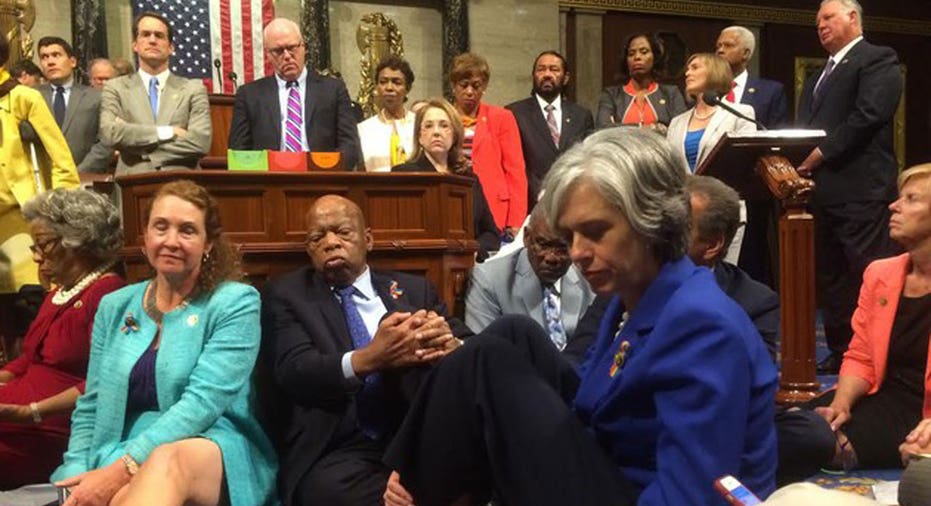Democrats Wind Down Gun Protest After Occupying U.S. House

Democrats in the U.S. House of Representatives began winding down a "sit in" at the chamber on Thursday, but vowed to renew the fight for more gun control after the gay nightclub shooting in Orlando, Florida, despite strong Republican opposition.
Scores of Democrats flooded the House floor for some 16 hours, sitting in the aisles and bringing business to a halt, to demand that Republican House leaders allow a vote on gun-related legislation after the June 12 shooting in which a gunman killed 49 people and wounded 53 others.
Republicans then retook control of the chamber, forced through several unrelated measures, adjourned the House and announced there would be no more votes until after the July 4 national holiday.
But Representative John Lewis, a Democrat from Georgia and a civil rights leader from the 1960s who led the protest, said the fight to secure greater control of weapons would go on.
"Today we've come a distance. We've made some progress. We've crossed one bridge, but we have other bridges to cross," said Lewis. "And when we come back in July, we'll start all over again. The American people, they want us to act, they want us to do something."
Gun control is a potent political issue and Americans are on edge after mass shootings in recent years in Connecticut, Colorado, California and elsewhere. The protest and rowdy scenes in the House reflected what is fast becoming a heated issue in the Nov. 8 U.S. presidential election.
Democrats were seeking votes on legislation to expand background checks for gun purchases, as well as measures to curb the sale of weapons to people on government watch lists.
Republicans, angry for having lost control of the chamber for most of a day, denounced the sit-in as a publicity stunt. Chaotic scenes ensued when several Republican representatives charged the chamber floor and yelled at protesting Democrats, prompting a confrontation that nearly descended into fisticuffs.
Republican House Speaker Paul Ryan refused Democrats' demands for action on gun control, insisting he would not bring up any bill that would take away gun owners' constitutional rights.
Instead he forced votes on unrelated legislation. Democrats held up signs honoring gun violence victims during the votes and sang "We Shall Overcome," the anthem of the civil rights movement.
Ryan called for decorum but could scarcely be heard over Democrats chanting "no bill, no break!" to demand action on guns.
"The House is focused on eliminating terrorists, not constitutional rights of law-abiding citizens. And no stunts on the floor will change that," Ryan's spokeswoman AshLee Strong said.
ECHOING THE SENATE
The Democrats' move echoed last week's filibuster by Senate Democrats to protest against inaction on guns in the wake of the Orlando mass shooting, the worst in modern U.S. history.
After the Senate talk-a-thon, the Senate's Republican majority scheduled votes on four gun control measures - all of which failed on Monday. Work on a compromise is under way.
Congress has not passed major gun control legislation since 1994, with gun rights defenders saying such measures infringe the constitutional right to bear arms.
Pleading for action on gun control, House Democratic Leader Nancy Pelosi invoked not only Orlando but other mass shootings, including an attack a year ago by a white man at a black church in Charleston, South Carolina, that killed nine people.
"Just because they have left doesn't mean we are taking no for an answer," she said after Republicans departed.
Several Democratic senators crossed the Capitol on Wednesday to join protesters, including Senators Elizabeth Warren, Tim Kaine and Cory Booker, all mentioned as potential running mates for presumptive Democratic presidential nominee Hillary Clinton, who voiced her support on Twitter.
Lawmakers also took to social media to document their demonstration with video and pictures.
Outside the Capitol, dozens of supporters gathered in solidarity at a rally organized by the advocacy group Everytown for Gun Safety.
(Additional reporting by Richard Cowan, Timothy Gardner, Patricia Zengerle and Ruthy Munoz; Editing by Susan Heavey, Paul Tait and Richard Balmforth)



















